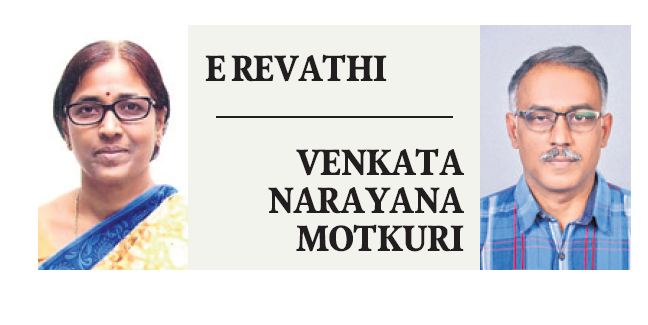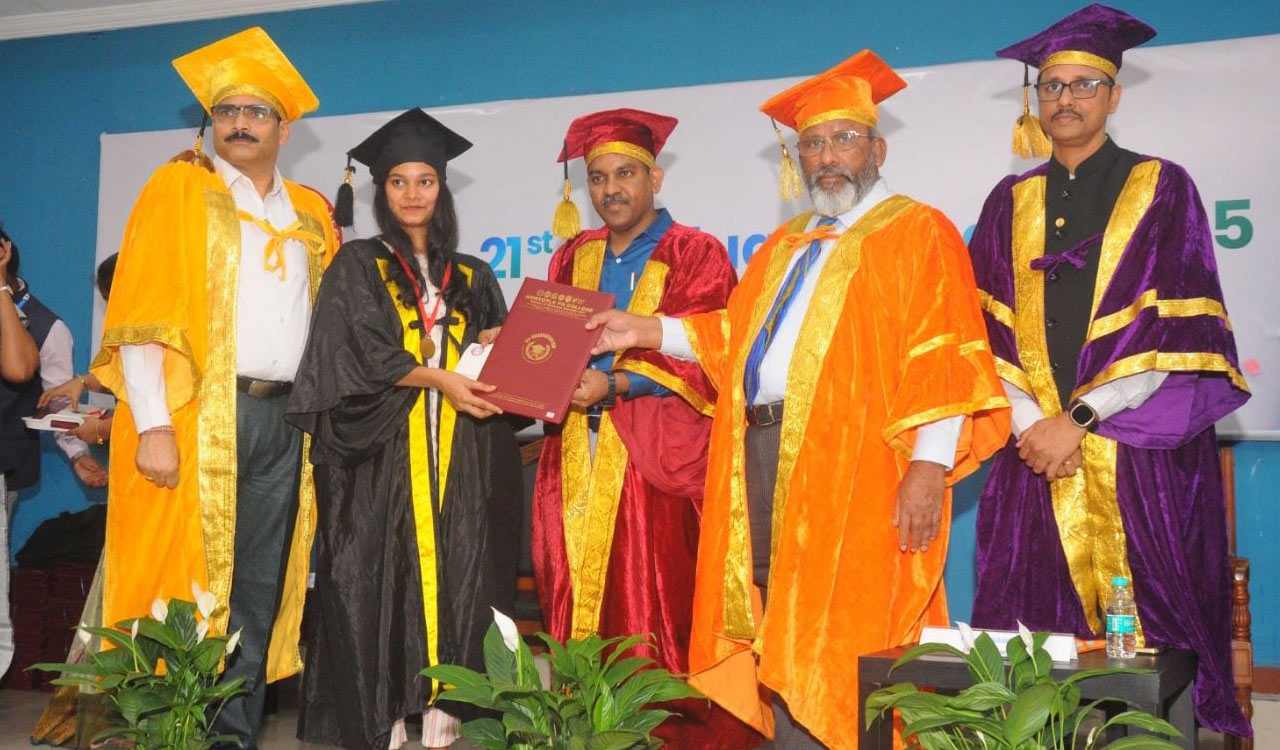Opinion: Getting together for enhanced learning
By E Revathi, Venkatanarayana Motkuri The Telangana State Council for Higher Education (TSCHE) has initiated necessary steps to implement the National Educational Policy-2020, beginning with the cluster system in Higher Educational Institutions (HEIs) in the State. To begin with, nine autonomous degree colleges in Hyderabad have formed a cluster. Cluster approach as a strategy enhances […]

By E Revathi, Venkatanarayana Motkuri
The Telangana State Council for Higher Education (TSCHE) has initiated necessary steps to implement the National Educational Policy-2020, beginning with the cluster system in Higher Educational Institutions (HEIs) in the State. To begin with, nine autonomous degree colleges in Hyderabad have formed a cluster.
Cluster approach as a strategy enhances ‘student learning experience’, a core aspect of the NEP, by widening the choice of courses with pooling of resources, both physical and teaching (human) resources of the participating institutions. This leads to optimal utilisation of existing resources without causing any financial burden.
Borrowed from Industry
In India, the Kothari Commission recommended the cluster approach for both school and collegiate education. The National Knowledge Commission also recommended this for higher education. Accordingly, the UGC mooted the idea in the 12th Plan and RUSA (Rashtriya Uchchatar Shiksha Abhiyan) had an implementation plan and guidelines too. Some of the States have taken initiatives in accordance with the UGC proposal in 2009 and then following the RUSA guidelines.
The concept of clustering has been borrowed from industry. In the case of industrial clusters, the core and ancillary industries are located in geographical proximity, which reduces transportation and transaction costs along with the advantages of sharing knowledge and technology. ‘Clustering’ as adopted in education is the grouping of colleges in closer geographical locations for academic and pedagogic, economic and administrative purposes. It is advantageous in the resource scarcity context, especially in the developing countries, where both underutilisation/overutilisation of resources can be avoided and participating higher education institutions reap positive externalities. This is made possible by pooling and sharing of resources: human (teachers); learning material (libraries and books, e-learning sources etc.); physical (labs, auditoriums, playground); and financial (if any).
NEP Context
As the NEP-2020 envisages developing large, multidisciplinary and autonomous HEIs, this can be achieved through clustering of colleges into a single functional entity, making a large autonomous and multidisciplinary institution (more holistic clustering). Secondly, enhancing student choice and learning experience requires widening the choice of courses for them and learning facilities. It needs expanding courses offered in each HEI and introduction of Choice-based Credit System (CBCS).
The NEP also envisages mandatorily offering vocational or skill development courses. Accordingly, colleges have to expand the availability of learning material – libraries and books along with that of physical resources – labs and so on. Moreover, student support facilities and programmes are critical as per the vision.
To offer a broader choice of courses, colleges need to have diverse faculty. It also requires provisioning all the learning material, facilities and student support programmes. It may be financially unviable for colleges to have all such arrangements. Even though a college provides diverse courses, the problem of underutilisation looms large.
The cluster approach offers the advantage of optimisation. Every college individually need not have all faculty required for all the courses they offer. They can share the services of faculty and resources of their partner colleges through networking and forming a cluster. Cluster-level hiring of faculty and establishing facilities can be done by pooling finances and sharing costs.
Cluster Models
Holistic Cluster: Under this, a cluster of colleges function as a single unit while retaining the dual identity (ie, cluster and college identities) of partner or constituent colleges. Each institution functions as an autonomous entity ideally fulfilling the objective criterion for autonomy. Here, all the constituent colleges are disaffiliated from university. Certain principles of governance like equal status, collective decision-making, autonomy and accountability, independence and interdependence are to be followed by all constituent or partner colleges.
The governance system of the cluster is organised with three overarching bodies at the level of cluster: Governing Body, Executive Body and Academic Committee along with that of Finance Committee. The representation of constituent or partner colleges in these bodies is based on the principle of equal representation.
Middle Range Cluster: This model is similar to that of holistic cluster but differs in that colleges do not have full-fledged autonomy, ie, they are not disaffiliated from university. All the constituent/partner colleges of the cluster keep their affiliation intact with university, and carry dual identity.
Purposive Cluster: This is case and context-specific. Clustering occurs for a particular component or purpose. For example, to fulfil the specific objective of enhancing student choice and learning experience, widening the choice of courses for students is required, which implies expanding courses offered in each HEI. Therefore, clustering is required to pool and share the resources optimising their utilisation without any additional financial burden on an individual institution. This model also requires a cluster level governing and monitoring mechanism.
Guiding Principles
The vision and goals of higher education of Access, Equity and Quality should be the guiding principles for implementing the cluster strategy. Sharing of human, economic, financial, pedagogic resources ensures affordability, and collective governance structures ensure accountability. The driving force must be the shared vision with broader objectives encompassing benefits to students, imparting quality education and educational development. Colleges must voluntarily form a cluster based on principles of independence as well as interdependence. It must allow and facilitate sharing of resources and developmental opportunities for the institutions, faculty and students.
The TSCHE has formed committees and drafted guidelines for the implementation of the cluster system as well as for infrastructure and resource sharing. With the pilot project rolling out, ground-level inputs would help in understanding the issues and challenges in implementing this strategy and accordingly resolving these to proceed further.

(E Revathi is Professor and Director, Centre for Economic and Social
Studies [CESS], Hyderabad. Venkatanarayana Motkuri is Associate
Professor, Research Cell on Education, CESS)
Related News
-
Maximum professors of practice hired in Tamil Nadu followed by Maharashtra, Gujarat: UGC Data
-
Opinion: UGC Equity Regulations, 2026 — Contrary to the equity principle
-
‘Will divide society and have grave repercussions’: SC stays UGC’s new equity regulations, issues notice
-
Aristotle PG College holds 21st Graduation Day
-
Two Belgian Malinois sniffer dogs inducted into Kothagudem district police force
11 mins ago -
Casagrand Introduces Hyderabad’s First UPARTMENT with the launch of Casagrand Mandarin in Miyapur
15 mins ago -
Cheques distributed to women at Nava Women Empowerment Centre
25 mins ago -
Jagan alleges irregularities in Tirupati laddu ghee supply during Chandrababu Naidu’s tenure
28 mins ago -
15-month-old boy etches his name on international record book in Nirmal
37 mins ago -
Gold ornaments stolen from woman at Jogipet bus station
43 mins ago -
Disqualification of BRS turncoat MLAs inevitable, elections soon, says KP Vivekanand
45 mins ago -
KTR writes open letter to CM, demands budget allocations for six guarantees
47 mins ago




